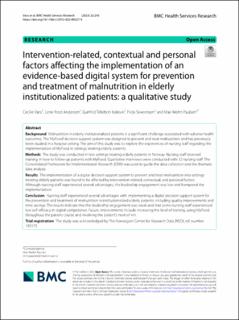| dc.contributor.author | Varsi, Cecilie | |
| dc.contributor.author | Andersen, Lene Frost | |
| dc.contributor.author | Koksvik, Gunhild Tellebon | |
| dc.contributor.author | Severinsen, Frida | |
| dc.contributor.author | Paulsen, Mari Mohn | |
| dc.date.accessioned | 2023-12-28T12:54:55Z | |
| dc.date.available | 2023-12-28T12:54:55Z | |
| dc.date.created | 2023-03-30T17:32:35Z | |
| dc.date.issued | 2023 | |
| dc.identifier.citation | Varsi, C., Andersen, L. F., Koksvik, G. T., Severinsen, F., & Paulsen, M. M. (2023). Intervention-related, contextual and personal factors affecting the implementation of an evidence-based digital system for prevention and treatment of malnutrition in elderly institutionalized patients: a qualitative study. BMC Health Services Research, 23(1), Artikkel 245. | en_US |
| dc.identifier.issn | 1472-6963 | |
| dc.identifier.uri | https://hdl.handle.net/11250/3109029 | |
| dc.description.abstract | Background: Malnutrition in elderly institutionalized patients is a significant challenge associated with adverse health outcomes. The ‘MyFood’ decision support system was designed to prevent and treat malnutrition and has previously been studied in a hospital setting. The aim of this study was to explore the experiences of nursing staff regarding the implementation of MyFood in settings treating elderly patients.
Methods: The study was conducted in two settings treating elderly patients in Norway. Nursing staff received training in how to follow-up patients with MyFood. Qualitative interviews were conducted with 12 nursing staff. The Consolidated Framework for Implementation Research (CFIR) was used to guide the data collection and the thematic data analysis.
Results: The implementation of a digital decision support system to prevent and treat malnutrition into settings treating elderly patients was found to be affected by intervention-related, contextual, and personal factors. Although nursing staff experienced several advantages, the leadership engagement was low and hampered the implementation.
Conclusion: Nursing staff experienced several advantages with implementing a digital decision support system for the prevention and treatment of malnutrition in institutionalized elderly patients, including quality improvements and time savings. The results indicate that the leadership engagement was weak and that some nursing staff experienced low self-efficacy in digital competence. Future improvements include increasing the level of training, using MyFood throughout the patient course and involving the patient’s next-of-kin. | en_US |
| dc.language.iso | eng | en_US |
| dc.rights | Navngivelse 4.0 Internasjonal | * |
| dc.rights.uri | http://creativecommons.org/licenses/by/4.0/deed.no | * |
| dc.title | Intervention-related, contextual and personal factors affecting the implementation of an evidence-based digital system for prevention and treatment of malnutrition in elderly institutionalized patients: a qualitative study | en_US |
| dc.type | Peer reviewed | en_US |
| dc.type | Journal article | en_US |
| dc.description.version | publishedVersion | en_US |
| dc.rights.holder | © The Author(s) 2023. | en_US |
| dc.source.volume | 23 | en_US |
| dc.source.journal | BMC Health Services Research | en_US |
| dc.source.issue | 1 | en_US |
| dc.identifier.doi | https://doi.org/10.1186/s12913-023-09227-8 | |
| dc.identifier.cristin | 2138667 | |
| dc.source.articlenumber | 245 | en_US |
| cristin.ispublished | true | |
| cristin.fulltext | original | |
| cristin.qualitycode | 2 | |

